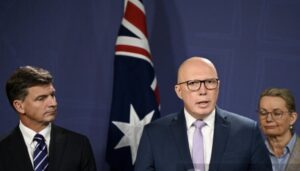We are not alone
If you ignore the 27 countries in the EU emissions trading scheme, a handful of others with their own carbon tax, New Zealand, and a bunch of north American states and provinces, including California, then Australia is completely alone in forging ahead with a carbon price. Well, it was. South Korea, despite intense lobbying from industry, this week passed a bill with almost unanimous support to begin an ETS in 2015. That seeks to cut its emissions to 30 per cent below business as usual by 2020, which is even more ambitious than Australia, which will result in a 23 per cent cut (at its current 5 per cent absolute reduction from 1990).
HSBC pointed out that Mexico’s climate change laws, passed last month, are even more ambitious. Both South Korea and Mexico aim for 30 per cent below BAU, but while this translates into a 4 per cent cut in absolute emissions for Korea, it represents a 12 per cent cut from 2005 levels for Mexico – which has a per capita energy emissions of 4t/Co2-, compared to around 12t/co2-e for Korea and 18t/Co2-e for Australia.
HSBC notes that Mexico’s law mandates a National Adaptation Policy and includes a phasing out of fossil fuel subsidies, the creation of a National Green fund and also a national emissions trading system. “We think this proactive stance will enable Mexico to retain a competitive position as and when global emission regulation becomes tougher – something Korea’s emission trading scheme (and green growth plan) is also trying to do.”
Clive Palmer is funny
Clive Palmer clearly has a sense of humour. TCPS (The Clive Palmer Show) began the week with consecutive matinee performances in Brisbane, the first to announce he would spend the next 15 months knocking on doors in the seat of Lilley in a bid to unseat the sitting member, the Treasurer Wayne Swan. Or he would end an emissary.
The second matinee performance was the coup-de grace. Just a fortnight after the 100th anniversary of the sinking of the Titanic, TCPS announced he would build a modern version of the Titanic, backed by Chinese interests, presumably to re-enact the whole thing over again. But let’s just put this in context. To many, including US Energy Secretary Stephen Chu, climate change is “Titanic, the sequel,” driven on to the iceberg by what the director James Cameron described as “the Titanic parable of arrogance, of hubris, of the sense that we’re too big to fail.” But metaphors are not good enough for TCPS, so he’s going to re-enact the whole thing again. Perhaps he will add a little flourish and make sure the new ship is solar-powered.
Start-stop on renewables?
One hand giveth, and the other taketh away. On the same day that Origin Energy announced that it had entered its largest ever power purchase agreement, for a 270MW, $600 million wind farm in South Australia, giving hope that the wind energy industry might finally see the end of three years of stagnation, its managing director Grant King was out speaking to the big end of town in Sydney pushing for a change to the renewable energy target that would likely put the wind energy industry back in a bottle for another four years.
Origin, which once suggested the target be adjusted to a 25/25 target rather tan 20/20, has finessed this argument and is now suggesting that the RET reflect 20 per cent of actual demand, rather than predicted demand. And if the small scale generation on household rooftops were thrown in, this would reduce the large scale renewable energy target to 27 terrawatt hours from 45 terrawatt hours.
Industry estimates that could reduce the build out of wind (and solar PV in coming years) by nearly half, or by more than $10 billion and naturally, allow more room for gas fired generators (and maybe some hydro projects from PNG). The irony is that Origin itself has predicted there is no demand for baseload generation until 2020, and that the only new generation required would be peaking plant to meet, well, peaking demand. The other irony is that it was the retailers themselves who had pushed for a fixed target on the basis of “certainty” and now want it to change it when the model no longer suits.
Ferguson catches a wave of good intent
It seems that the Federal Government is finally determined that Australia should make more of its natural advantages than simply sell its best ideas and sun-bake and swim in its renewable resources. Last month, the government announced a $9.3 million project through the Australian Solar Institute to repatriate the rooftop version of a solar thermal technology developed in Sydney. The utility scale version of the technology is owned by Areva, but the smaller scale is held by Chromasun, which is looking to see if the technology can be manufactured in Australia.
Similarly, three years after passing up Carnegie Wave Energy’s CETO technology in favour of a US technology has gotten nowhere, the government has given the Perth-based company $10 million to establish a 2MW grid-connected demonstration plant off Fremantle. Carnegie’s Michael Ottaviano says this it is critical to keeping the technology in Australia, and being able to export its know-how. The 2MW plant will also be crucial in proving its reliability to energy buyers and to financiers, who will hold the keys to further deployment and ultimately reducing the costs of the technology to around 100/MWh, where it will offer stiff competition to wind, solar and gas-fired energy.
This rule only applies to other people
For many years, miners have been leading the demonization of green energy subsidies, arguing that they were effectively supporting investments that would otherwise not be commercial. How ironic, then, that they should be using the same argument to support their arguments for the retention of the diesel fuel rebate, which returns round $2 billion a year to the coffers of mining companies using diesel for transport and energy supplies in remote areas.
Rio Tinto and BHP Billiton are among those to suggest that some mining investments may no longer be commercially attractive and may not go ahead if the rebate is scrapped, even Olympic Dam is some reports are to be believed. But, as the International Energy Agency has noted on many occasions, fossil fuel subsidies (which outmuscle renewable energy subsidies by a ration of nearly 10 to one) are the greatest impediment to the adoption of green energy, and the diesel fuel rebates are exactly the sort of subsidies that are in the IEA’s firing line.











